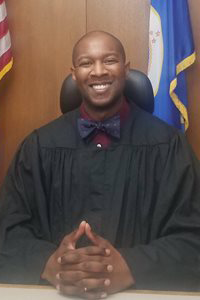District Court Judge

Chisago County
View state court bio
INFORMATION COLLECTED APRIL 12, 2023
Contact with Chambers
• Preferred method to contact chambers: Email
• To whom may attorneys direct scheduling/logistical questions? Elizabeth (Liz) Olson and/or Emily Blaeser
• To whom may attorneys direct substantive questions? Emily Blaeser
• Set forth your practices and procedures for scheduling motion hearings. Parties submit motions and request a hearing; Court Administration schedules the hearings.
• Do you accept telephone calls from attorneys to rule on discovery disputes that occur during depositions? No.
• How much time do you allot for motion hearings? > 1 hr
• Set forth your practices and procedures with respect to attending a hearing by telephone or video conference. I do not permit hearings by telephone. I set a hearing a long date out; this typically requires me to strike and reset the trial date; that said, the discovery issues typically resolve themselves before the motion hearing.
• Set forth your practices and procedures with respect to discovery motions. I set a hearing a long date out; this typically requires me to strike and reset the trial date; that said, the discovery issues typically resolve themselves before the motion hearing.
• Set forth your practices and procedures with respect to stipulations of the parties, including stipulations for protective orders. Parties either submit a joint proposed order; or competing proposed orders.
• Do you have any particular requests or procedures relating to requests to amend the scheduling order? Amendments are by joint agreement; otherwise, I pick a date without attorney input.
• Set forth your practices and procedures with respect to default proceedings. Set a hearing, if the defaulter does not appear within 10 mins of the hearing, I'll typically grant the motion.
• Do you want to receive paper courtesy copies of the parties' written submissions? If you do, set forth the number of courtesy copies and identify any document type you do not want to receive. No.
Pre-Trial Procedures
• Set forth your practices and procedures with respect to the submissions of additional legal authority or other materials at or after oral arguments. I do not review anything after the arguments.
• Describe your preferred procedures for pretrial settlement conferences, including the timing of such conferences, persons who must attend, whether persons may attend by telephone or video conference, and how you participate in settlement discussions. Parties in-person in Chisago County and sit in a conference room until they either reach an agreement or the end of the duty day. I do not grant request for remote hearings for settlement conferences.
• Identify what technology you use in the courtroom and state whether you prefer a particular electronic format. I'm unsure what all is in the court, I have no preference.
• Set forth your practices and procedures with respect to attorney’s use of technology in the courtroom and during trial. Attorneys can try their case however they deem fit; they need to coordinate technology in advance and not expect the Court or court administration to aid them during the hearing.
• Do you permit parties to bifurcate oral argument so different attorneys address different legal issues? This has not been an issue yet.
In-Person Trials
• Are you willing to provide a date certain for trial? Absolutely not.
• Set forth your practices and procedures for handling motions in limine. I hear Motions in Limine the day before a jury is empanelled or presentation of evidence.
• What is your schedule for a typical trial day? Zoom calendar call on Monday; Preliminary Issues on Monday; Lingering preliminary issues Tuesday at 8:30a to iron out any lingering preliminary issues; voir dire Tuesday at 10a; Trial Weds.
• Set forth your voir dire procedures. I treat it like a criminal voir dire; I ask questions first, then the defendant, then plaintiff; parties may not repeat questions.
• Set forth your practices and procedures with respect to courtroom decorum, including movement in the courtroom, use of a podium, whether attorneys should sit or stand, and how to address witnesses. No preference. My only fast/hard rule is to address witnesses by title and surname.
• Do you impose time limits with respect to opening statements and closing arguments? No.
• Identify what technology you use in the courtroom and state whether you prefer a particular electronic format. No preference. Whatever is in the courtroom is fine.
• Set forth your practices and procedures with respect to attorney’s use of technology in the courtroom. None.
• Set forth your practices and procedures with respect to marking and using exhibits. Parties submit exhibits via MNDES in advance of the trial date; parties bring physical copies of the exhibits to the court; all exhibits must be labeled in advance.
• For exhibits uploaded to the Minnesota Digital Exhibit System (MNDES), set forth your preferences regarding naming conventions for files uploaded to the system. We do not have a naming convention; we should though.
• Set forth your practices and procedures with respect to handling objections. State the basis, but parties are not permitted "speaking objections." I rule on the record, then provide a detailed analysis outside the presence of the jury during recesses.
• Set forth your practices and procedures with respect to the use of deposition testimony. None.
• May attorneys obtain daily transcripts during trial? If so, what procedure should attorneys follow? If my court reporter is comfortable producing daily transcripts; costs and timelines are negotiated between the requesting party and my court reporter.
• Set forth any other preferences, practices, or procedures attorneys and parties may find helpful. None. I've only done one civil jury trial.